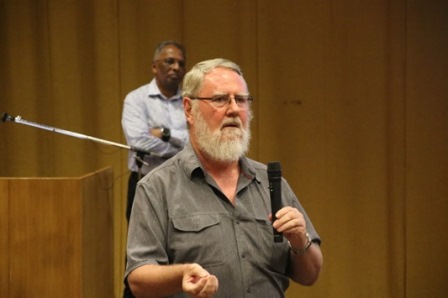Virtual mobility is part of the world that we live in and for educators, this means designing learning and teaching experiences for mobile first.
This was the message of Professor Rory McGreal, UNESCO/International Council for Open and Distance Education Chair in Open Educational Resources (OER) from Athabasca University, Canada during a public seminar organised by The University of the South Pacific’s (USP) Centre for Flexible Learning (CFL) as part of the Open Education Week,which was hosted from 4 – 8 March 2019.

The Open Education Week is promoted by the Open Education Consortium, which is a global network of educational institutions, individuals and organisations that support an approach to education that is based on openness, including collaboration, innovation and collective development and use of open educational materials.
Professor McGreal presented on Open Education and Training for Economic Development, whereby he reiterated the importance of digital and open learning to drive the world economy forward.
He said that designing for mobile first would mean that people can easily convert it to paper or face-to-face teaching, contrary to designing for the latter first.
Professor McGreal highlighted that the challenge for the 21st century educators is to look for methods of educational deliveries for large masses of learners, located in different parts of the world.
He emphasised that the largest companies in the world are based on bits of information, and are larger than those that produce tangible goods and services.
“It is these bits of information that drive the world economy, and the characteristic about them is zero mass and volume, that can be moved infinitely around the world,” he said.
Furthermore, he informed that in today’s world, economic activity is going more towards learning and training.
“Education and training are becoming the centre of world economy, and we as educators are the centre of the world economy. We are the ones working to transfer knowledge to different people,” Professor McGreal said.
He stressed that human capital has never been so important adding that, finding, training, and keeping knowledge workers is crucial.
“There is increased mobility of workforce, whereby you do not need to be on any particular site, rather we can work from anywhere,” he said.
Professor McGreal shared his thoughts about Open Educational Resources and Creative Commons.
He also spoke about self-directed learning, personal learning and connectivism, distance education, online learning, games for learning, digital rights management, digital licenses, credit transfers, recognition of prior learning, challenges for credit, and freedom for learners.
In launching Open Education Week at USP, Professor Som Naidu, Pro Vice-Chancellor Flexible Learning and Director of CFL said that Open Education is about Open Access, Open Learning and Open Scholarship.
And apart from this week’s activities, Professor Naidu mentioned that Open Educational Practices at USP, also included: the Development of an OER Policy for USP; development of an OER Repository for USP, OER Course Conversions, as well as notable initiatives such as the Pacific Centre for Flexible and Open Learning for Development; USP Global in partnership with CrystalDelta.
Deputy Vice-Chancellor Education, Professor Richard Coll said that the University, particularly in the last ten (10) years, has moved more towards digital technologies and providing access to enhanced learning.
Professor Coll said that the University started off with its digital learning through concerns raised by the students’ association about rising costs of textbooks which drove the University to introduce teaching and learning pedagogies that will reach more students with lower costs associated for both the University and the students.
The evening’s program also included a panel discussion with Associate Deans (Learning and Teaching) from each Faculty together with the University librarian.
The week-long programme comprises targeted workshops for all Faculties, facilitated by Professor McGreal.
The workshops are aimed to help educators find OER and learn how to integrate them in their teaching.
—Republished from the News@USP website managed by the Office of Strategic Partnerships, Advancement & Communications (SPAC)—